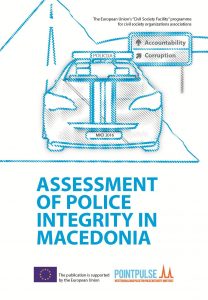2016 ASSESMENT OF POLICE INTEGRITY IN MACEDONIA
2016 ASSESMENT OF POLICE INTEGRITY IN MACEDONIA
Author(s): Magdalena Lembovska, Filip Stojkovski
Subject(s): Politics / Political Sciences, Politics, Governance, Security and defense, Corruption - Transparency - Anti-Corruption
Published by: BCBP Beogradski centar za bezbednosnu politiku
Keywords: police integrity; North Macedonia; police sector; corruption
Summary/Abstract: The Parliament provides basic oversight and control of the police. The Committee on Security and Defence, as a parent committee in charge of security-related issues, mainly deals with discussing draft legislation. The Standing Inquiry Committee for Protection of Civil Freedoms and Rights, which is authorised to review communications from citizens and whose findings could be used as grounds for initiating a procedure for accountability of public office holders, has not had any track record since establishment. At the same time, the existing oversight mechanisms, such as holding oversight hearings, remain underused. On the other side, members of the Parliament make good use of parliamentary questions. On paper, the Ombudsman is well positioned within the Macedonian institutional setup; however, he is faced with obstructions from the institutions in fulfilling his mandate and lack of cooperation with the Internal Control Unit of the Ministry of Interior and the Public Prosecutor’s Office. It should be noted that the Ombudsman has noted an increase in policy brutality and a decrease in the protection of human rights and freedoms. In regards to internal control, the Department for Internal Control, Criminal Investigations and Professional Standards has undergone structural changes that should allow greater authority and a better delineation between preventive and reactive work. The number of decisions taken in favour of citizens in the cases of excessive use of force remains very low, which undermines public trust in this body. Also, there have been allegations of politicisation of the work of the unit. The adoption of the Law on Whistle-Blower Protection represents a positive development. Still, the Law needs to be amended to become more precise, and the institutions involved in the process of whistle-blower protection need to be equipped with necessary resources (human, technical, financial) in order to be able to perform. As for the prevention of conflict of interest, the State Commission for Prevention of Corruption needs to overcome certain structural deficiencies, including lack of independence, in order to be recognised as an independent oversight mechanism.
Series: BCBP - Assessment of Police Integrity
- Page Count: 28
- Publication Year: 2016
- Language: English
- Content File-PDF

